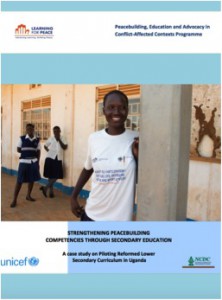
Strengthening Peacebuilding Competencies through Secondary Education: A Case Study on Piloting Reformed Lower Secondary Curriculum in Uganda, UNICEF, 2016
Uganda is planning a significant reform of the country’s secondary education in the form of a new curriculum that introduced both greatly amended teaching contents and methods compared to the existing curriculum, which was developed under British colonial rule in 1919.
UNICEF in partnership with Uganda’s National Curriculum Development Centre pilot-tested the reformed lower secondary curriculum in September – November 2015. Under UNICEF’s Learning for Peace programme, support has been provided to test excerpts of the reformed curriculum relating to peacebuilding competencies.
The pilot has been carried out in 23 schools in 5 Districts that have been sampled in Karamoja, Northern Uganda, West Nile and South-Western Uganda, and included test materials for the subjects of Social Studies, Life Education and Religious Education.
In this report the findings from a qualitative assessment carried out among three pilot schools in Napak District is presented together with feedback from students from approximately 20 per cent of participating schools.
Download the full report: Strengthening Peacebuilding Competencies through Secondary Education Case Study

